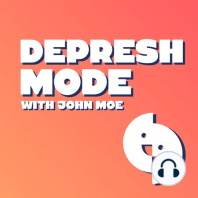46 min listen

School is Starting, Kids are Psychologically Messed Up, and We All Need to Help
School is Starting, Kids are Psychologically Messed Up, and We All Need to Help
ratings:
Length:
48 minutes
Released:
Sep 6, 2021
Format:
Podcast episode
Description
COVID has been traumatic for young people. For a year and a half now, it’s either been impossible to go to school or the place that they go to doesn’t match what they used to know as school. The virus may have caused severe illness or death in their families. It’s a frightening time for all of us and especially so among the youngest and most vulnerable. So as in-class education really begins again in earnest, what’s the state of these people showing up to the classrooms and how can we, not just as parents or teachers but members of society, help?We speak with Ruby Ramirez, principal in the Dallas Independent School District, about how she prepared her school for the state of mind the students are returning with. One thing that’s helped everyone feel better? Masks. Yep, the things that made everyone so uncomfortable in the earlier days of COVID now give students a sense of security in the classroom and hallways.Masks are a big deal for Dr. Robin Gurwitch as well. She’s a psychologist and Professor in Psychiatry and Behavioral Sciences at Duke University School of Medicine and she points out that one of the best ways to recover from our societal trauma is to stop the virus itself. To do that, wear your dang masks where you’re told to wear it. In the interview, Robin mentions some online resources that could help anyone.Here they are:National Child Traumatic Stress Network (www.nctsn.org or https://www.nctsn.org/what-is-child-trauma/trauma-types/disasters/pandemic-resources)American Psychological Association (https://www.apa.org/topics/covid-19/parenting-caregiving) National Child Traumatic Stress Network: Parent/Caregiver Guide to Helping Families Cope with COVID-19 https://www.nctsn.org/resources/supporting-children-during-coronavirus-covid19Center for the Study of Traumatic Stress: https://www.cstsonline.org/assets/media/documents/CSTS_FS_Discussing_Coronavirus_w_Your_Children.pdf https://www.cstsonline.org/assets/media/documents/CSTS_FS_Finding_Right_Words_Talk_Children_Teens_Coronavirus.pdfhttps://www.cdc.gov/coronavirus/2019-ncov/daily-life-coping/for-parents.htmlAmerican Psychological Association at https://www.apa.org/topics/covid-19). Thank you to all our listeners who support the show as monthly members of Maximum Fun. Hey, remember, you’re part of Depresh Mode and we want to hear what you want to hear about. What guests and issues would you like to have covered in a future episode? Write us at depreshmode@maximumfun.org.Help is available right away.The National Suicide Prevention Lifeline: 1-800-273-8255, 1-800-273-TALKCrisis Text Line: Text HOME to 741741.International suicide hotline numbers available here: https://www.opencounseling.com/suicide-hotlinesThe Depresh Mode newsletter is available twice a week. Subscribe for free and stay up to date on the show and mental health issues. https://johnmoe.substack.com/John's acclaimed memoir, The Hilarious World of Depression, is available here.Find the show on Twitter @depreshpod and Instagram @depreshpod.John is on Twitter @johnmoe.
Released:
Sep 6, 2021
Format:
Podcast episode
Titles in the series (100)
Song Imploder with A.C. Newman of The New Pornographers feat. Anxiety and Depression: We go deep inside the songwriter’s mind to learn how nagging mental problems and a devastating family crisis turned into a catchy tune. by Depresh Mode with John Moe